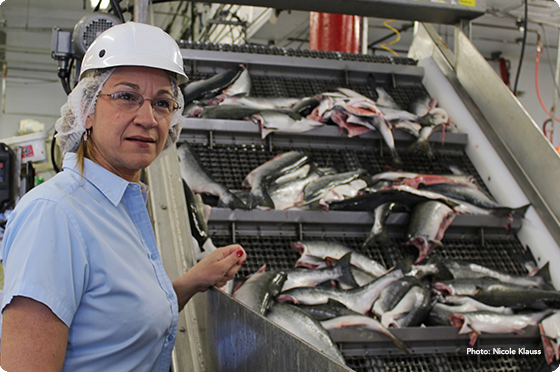
Workplace health and safety is a top priority to both employers and employees as they go back to work during the COVID-19 pandemic. Employers are at risk of litigation if they do not comply with the recommendations and guidelines issued by the CDC, OSHA, and state and local officials. Employers are also at risk if they do comply with these COVID-19 mandates and guidance. Some employers are mandating that workers quarantine before returning to work. Workers forfeit their personal time and mobility when they submit to mandatory quarantining. Does quarantining qualify as so essential to the job function that the workers deserve pay for the time, or is it part of weighing the costs and benefits of wanting to return to earning a paycheck? The financial determination of whether or not to pay workers for time in quarantine is not clear.
The Bristol Bay region, which is home to the largest sockeye run, experiences a large influx of seasonal workers to work in seafood processing facilities. The seafood processing industry has suffered several COVID-19 outbreaks. The nature of seafood processing makes COVID-19 precautions difficult to implement. Nevertheless, federal and state officials, the CDC, OSHA, employers, and employees have been working together to find solutions to COVID-19 risks and concerns. For example, the Bristol Bay region and Alaskan state officials issued Health Mandate 10 (“the Mandate”) to protect the local community and seafood processing workers as well as prevent the spread of COVID-19. The Mandate requires that employers implement a monitored 14-day quarantine with daily health checks for workers traveling to Alaska to work at seafood processing facilities.
On June 19th, 2020, the ARNS Law Firm filed a class action suit on behalf of seafood processing workers in the San Francisco Superior Court against North Pacific Seafoods, Inc. (“NPSI”), Intercontinental Hotel Group, PLC (“IHG”), and an unascertained third defendant (“Does 1 through 100, inclusive”). The plaintiff (“Jane Doe, and those similarly situated”) is seeking damages, restitution, and injunctive relief. Class members include the seasonal workers hired by NPSI to work at the Red Salmon Cannery (“RSC”) in Naknek, Alaska between June and August 2020. The complaint alleges (1) false imprisonment, (2) nonpayment of wages, (3) failure to pay minimum wage, (4) failure to pay overtime wages, (5) indemnification for losses caused by employer’s negligence, and (6) unlawful business practices.
During salmon season, NPSI hires seasonal workers to work at the RSC in Naknek, Alaska, which is located in the Bristol Bay region. These seafood processing workers come from both inside and outside the United States, and many only speak Spanish. NPSI arranged for the RSC workers to be tested and quarantined at Crowne Plaza LAX before transporting the seasonal workers to RSC. The tests were performed at the Crowne Plaza by a local clinic, where the workers claim that they were not allowed to properly socially distance or offered adequate hygiene services. Three days after the tests were performed, three workers tested positive for COVID-19. The workers were ordered to a quarantine for eleven more days to satisfy the mandatory 14-day quarantine. Fourteen workers chose to leave the hotel, end their quarantine, and withdraw from the group set to work at the RSC. The remaining complied with the quarantine guidelines and were transported to Nanek, Alaska pursuant to their application to work at the RSC.
The quarantined workers allege that they were falsely imprisoned by NPSI. They were not allowed to leave their rooms, and their room keys were deactivated. NPSI asserts that workers were provided three meals a day with additional snack bags every few days. The complaint insists that the workers were only provided two meals a day with the snack bags every few days. Nevertheless, the workers were neither allowed to order in other food or leave to exercise. The complaint asserts that the workers were threatened that they would be terminated if they violated the quarantine. Furthermore, the complaint asserts that while waiting to take the COVID-19 tests, the workers were not properly socially distanced and forced to share writing utensils while filling out paperwork. They suggest that the circumstances prior to the test caused some workers to test positive and require the additional 11-day quarantine beyond the initial 4-day quarantine period. They attribute the losses to time missing in which they could have been working. Moreover, the workers were not compensated with wages for their time quarantined, although NPSI covered all the expenses associated with the quarantine and tests. The complaint asserts that the workers are entitled to wages and overtime pay during the quarantine period.
NPSI defends their quarantine and claims that they worked closely with state officials to ensure the employer’s compliance with HealthMandate 10. The monitored quarantine requires that workers are screened prior to quarantine and that temperature checks are performed daily. Further, the Mandate recommends that workers stay in individual rooms with food delivered. The Mandate permits workers to leave their quarantine only to receive medical treatment. Since the lawsuit has been filed, NPSI has offered the potential class members a settlement offer. The offer includes $1,500 for wages and $500 for additional claims related to the quarantine at the Crowne Plaza. The plaintiff’s attorney has filed for an injunction to stop any settlement discussions, but the judge has yet to rule on this issue.
This case presents the tension employers face when setting and enforcing company policy as businesses begin to go back to work. All of the COVID-19 precautions have been implemented to counteract the risks of COVID-19 infection and spread, but they also present unforeseen challenges. Employers are incurring the costs of testing and quarantining employees to prepare their workplaces for re-opening, while workers are giving their time to the company as part of their employment to quarantine. The determination in this case will help shed light on whether employees should be compensated for their time spent in quarantine, but it is doubtful that this issue will be fully resolved by this case. It is imperative that employers stay informed about COVID-19 workplace litigation like this to ensure that they are implementing best practices and are aware of the full scope of expenses that they may be taking on by reopening.












